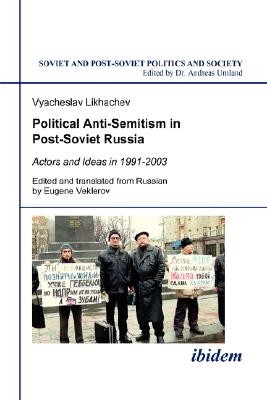
- We will send in 10–14 business days.
- Author: Vyacheslav Likhachev
- Publisher: Ibidem Press
- Year: 2006
- Pages: 244
- ISBN-10: 3898215296
- ISBN-13: 9783898215299
- Format: 14.8 x 21 x 1.3 cm, minkšti viršeliai
- Language: English
- SAVE -10% with code: EXTRA
Political Anti-Semitism in Post-Soviet Russia. (e-book) (used book) | bookbook.eu
Reviews
Description
Anti-Semitism was a major feature of both late Tsarist and Stalinist as well as neo-Stalinist Russian politics. What does this legacy entail for the emergence of post-Soviet politics? What are the sources, ideologies, permutations, and expressions of anti-Semitism in recent Russian political life? Who are the main protagonists and what is their impact on society?This book shows that anti-Semitism is alive and well in contemporary Russia, in general, and in her political life, in particular. The study focuses on anti-Semitism in political groups, mass media and religious organizations from the break-up of the Soviet Union until shortly before the elections to the fourth post-Soviet State Duma which saw the entry of a major new nationalist grouping, Rodina (Motherland), into the Russian parliament. The author analyzes various "justifications" for anti-Semitism, its manifestations and its ups and downs during this period. The book chronicles Russian federal and regional elections, which served as a "reality check" for the ultra-nationalists. Several sections are devoted to the role of anti-Semitism in political associations, including marginal neo-Nazi groups, "mainstream" nationalist parties, and the successor organizations of the Communist Party of the Soviet Union. A special section covers the financial sources for post-Soviet anti-Semitic publications. The author considers anti-Semitism within a wider context of religious and ethnic intolerance in Russian society. Likhachev, as a result, compiles a "Who is Who" of Russian political anti-Semitism. His book will serve as a reliable compendium and obligatory starting point for future research on post-Soviet xenophobia and ultra-nationalist politics.
EXTRA 10 % discount with code: EXTRA
The promotion ends in 22d.12:44:20
The discount code is valid when purchasing from 10 €. Discounts do not stack.
- Author: Vyacheslav Likhachev
- Publisher: Ibidem Press
- Year: 2006
- Pages: 244
- ISBN-10: 3898215296
- ISBN-13: 9783898215299
- Format: 14.8 x 21 x 1.3 cm, minkšti viršeliai
- Language: English English
Anti-Semitism was a major feature of both late Tsarist and Stalinist as well as neo-Stalinist Russian politics. What does this legacy entail for the emergence of post-Soviet politics? What are the sources, ideologies, permutations, and expressions of anti-Semitism in recent Russian political life? Who are the main protagonists and what is their impact on society?This book shows that anti-Semitism is alive and well in contemporary Russia, in general, and in her political life, in particular. The study focuses on anti-Semitism in political groups, mass media and religious organizations from the break-up of the Soviet Union until shortly before the elections to the fourth post-Soviet State Duma which saw the entry of a major new nationalist grouping, Rodina (Motherland), into the Russian parliament. The author analyzes various "justifications" for anti-Semitism, its manifestations and its ups and downs during this period. The book chronicles Russian federal and regional elections, which served as a "reality check" for the ultra-nationalists. Several sections are devoted to the role of anti-Semitism in political associations, including marginal neo-Nazi groups, "mainstream" nationalist parties, and the successor organizations of the Communist Party of the Soviet Union. A special section covers the financial sources for post-Soviet anti-Semitic publications. The author considers anti-Semitism within a wider context of religious and ethnic intolerance in Russian society. Likhachev, as a result, compiles a "Who is Who" of Russian political anti-Semitism. His book will serve as a reliable compendium and obligatory starting point for future research on post-Soviet xenophobia and ultra-nationalist politics.


Reviews